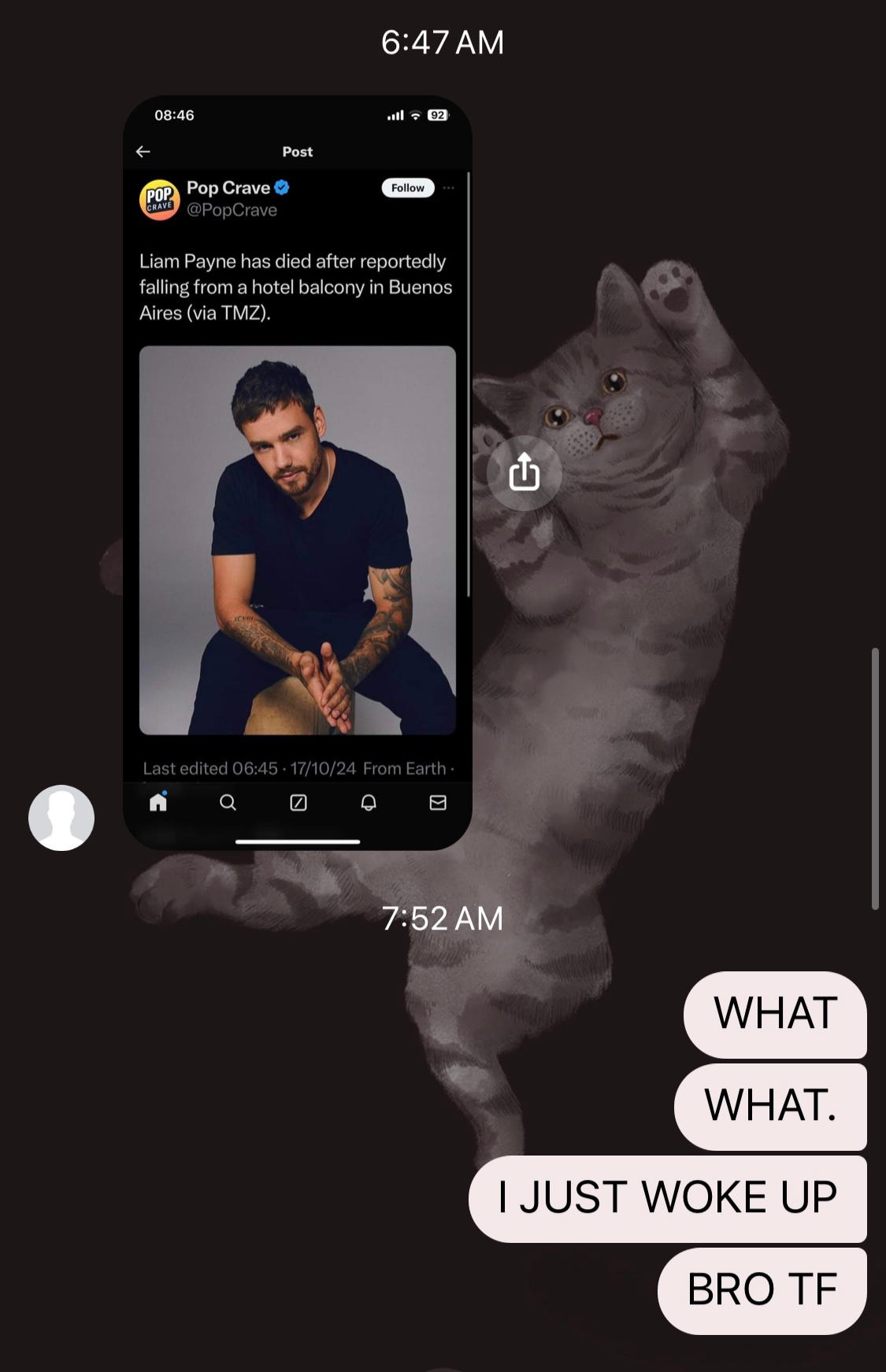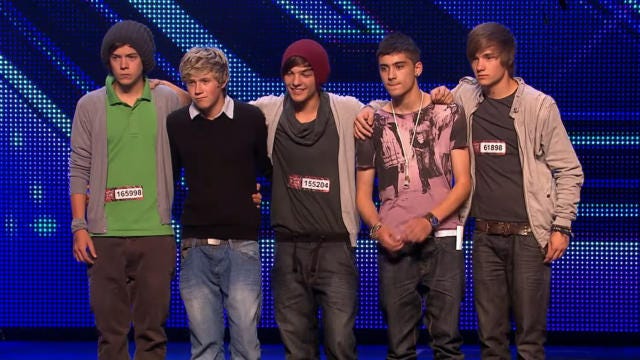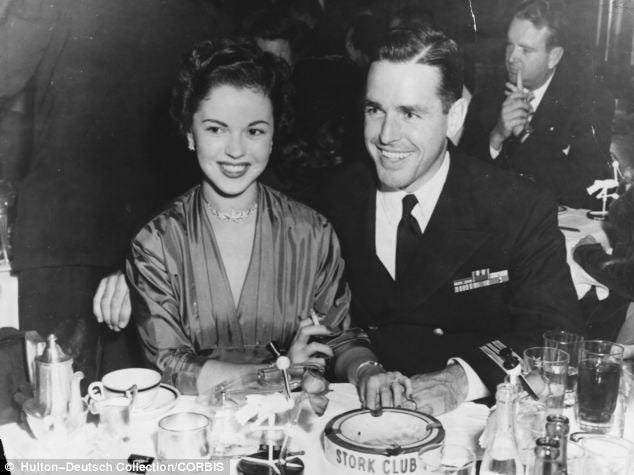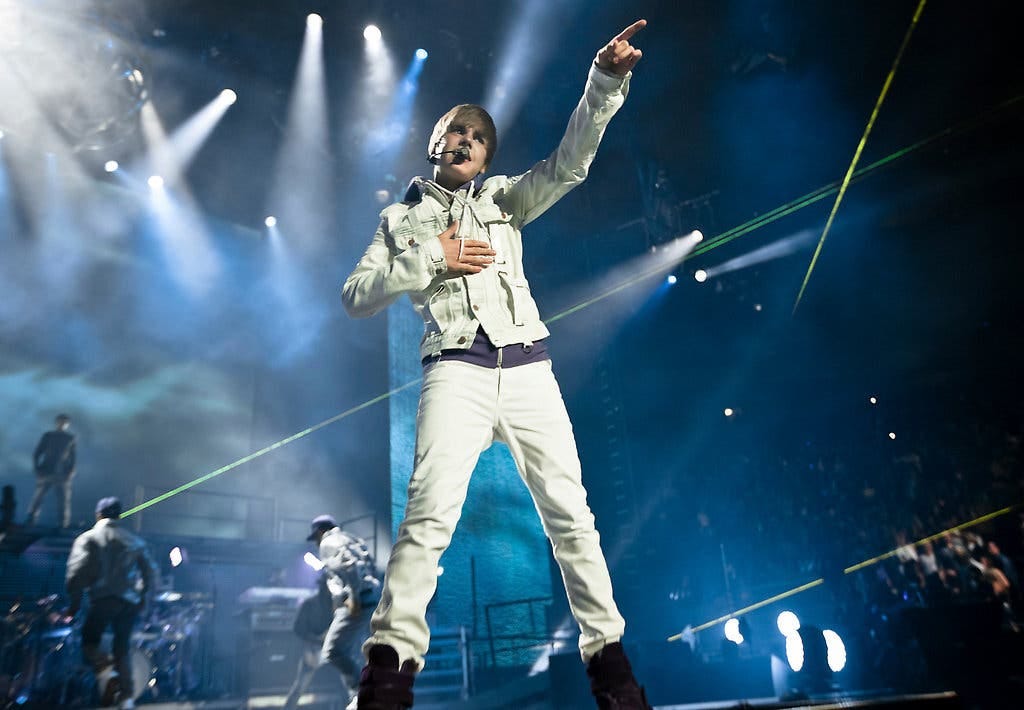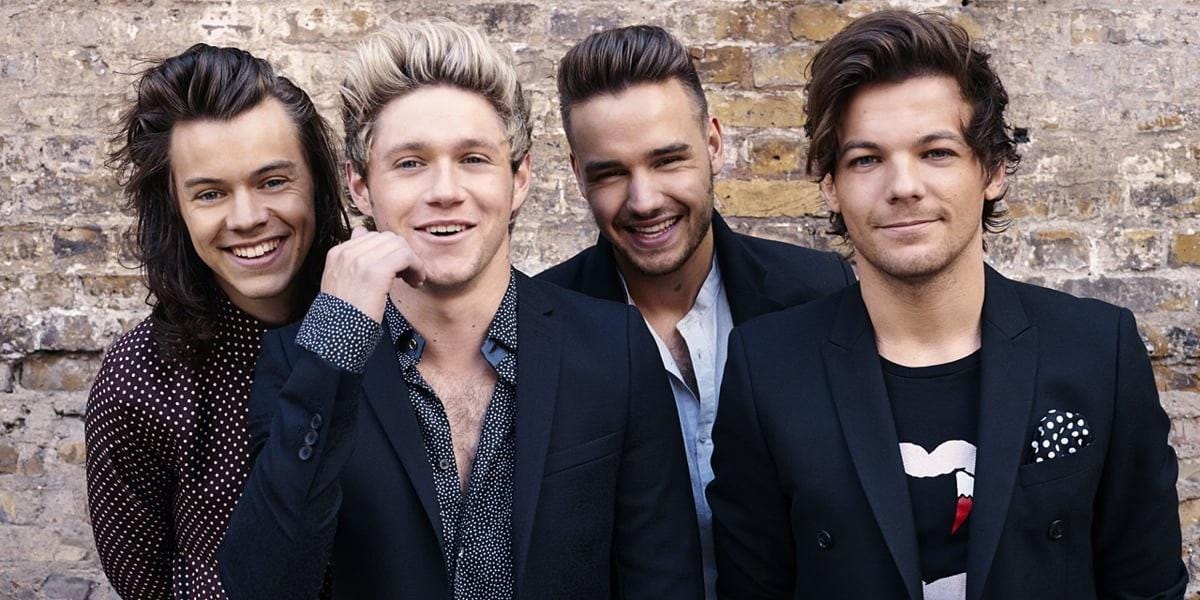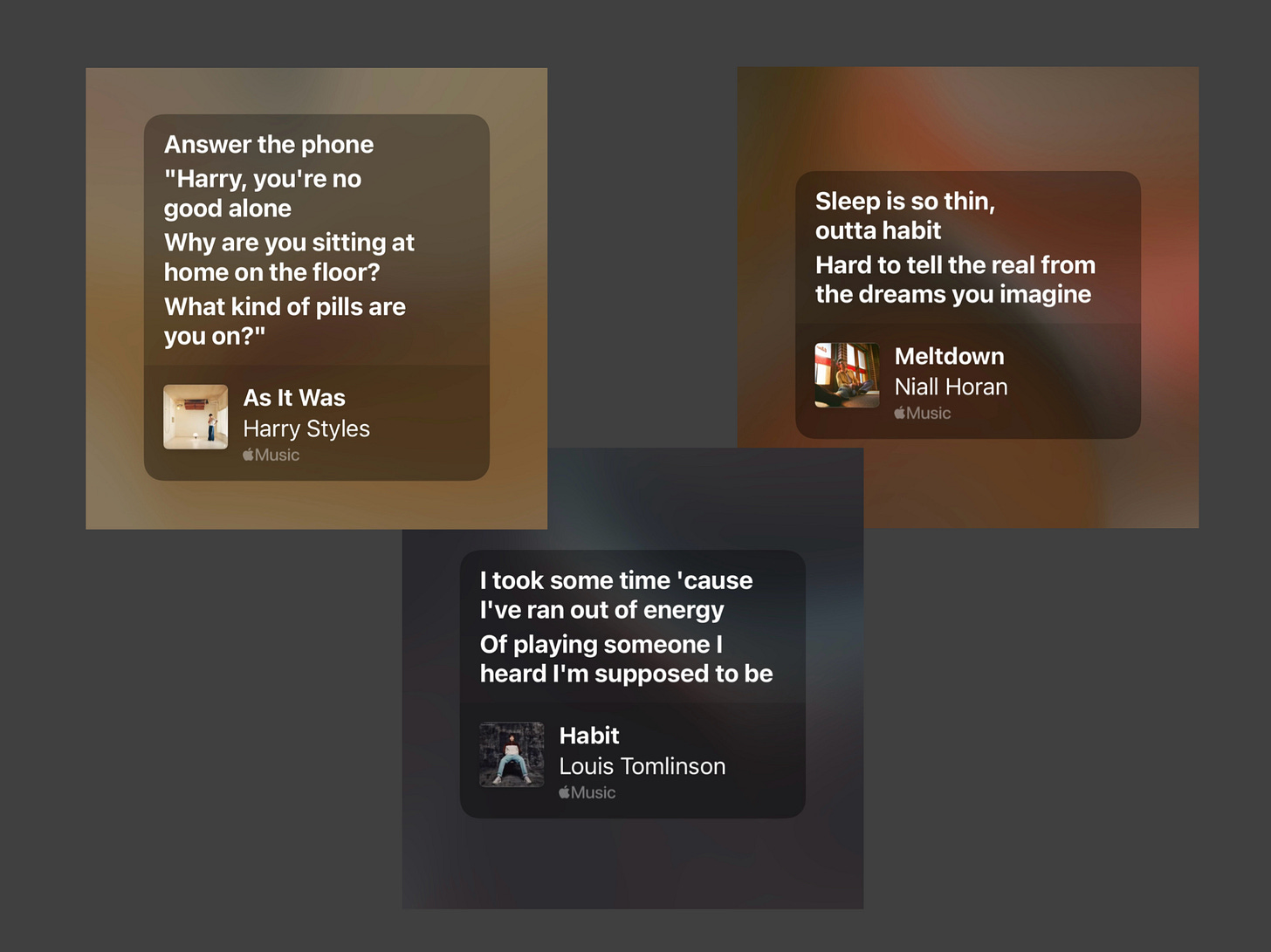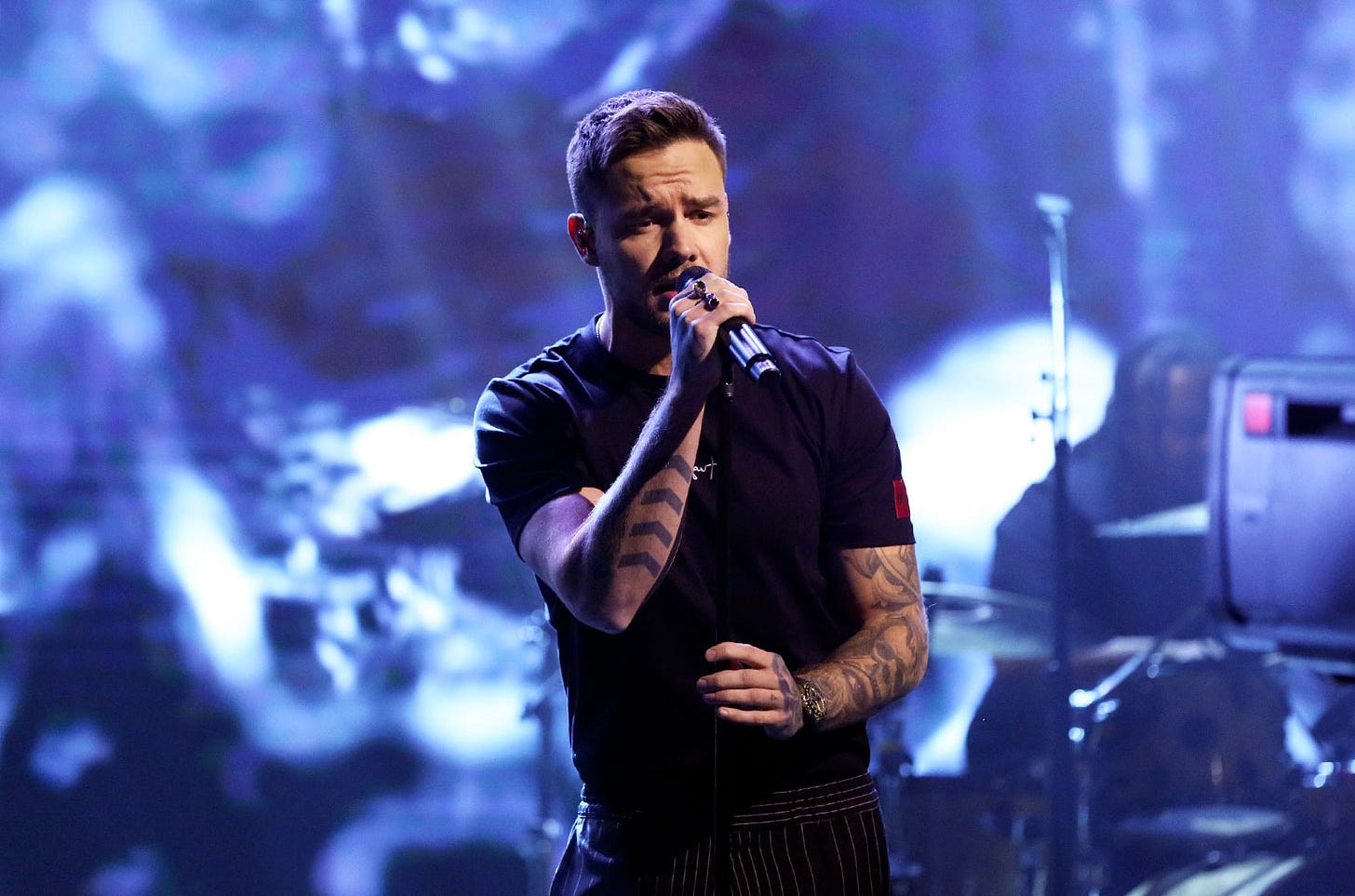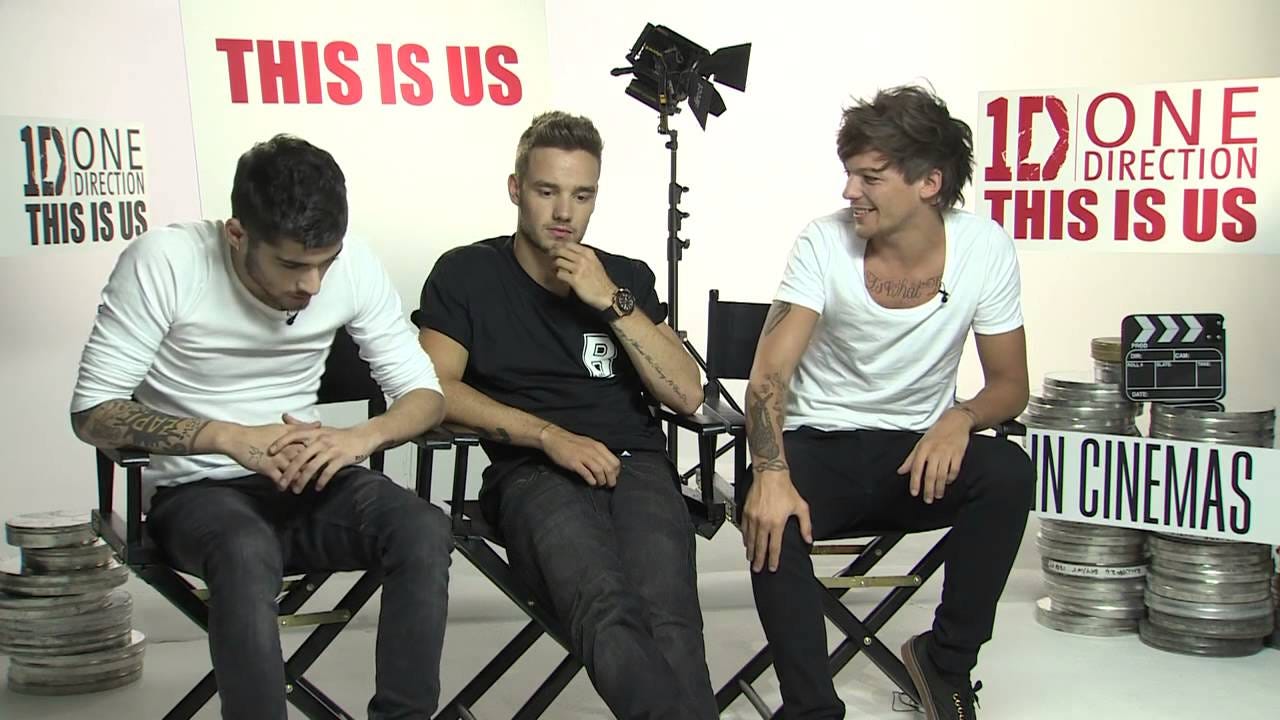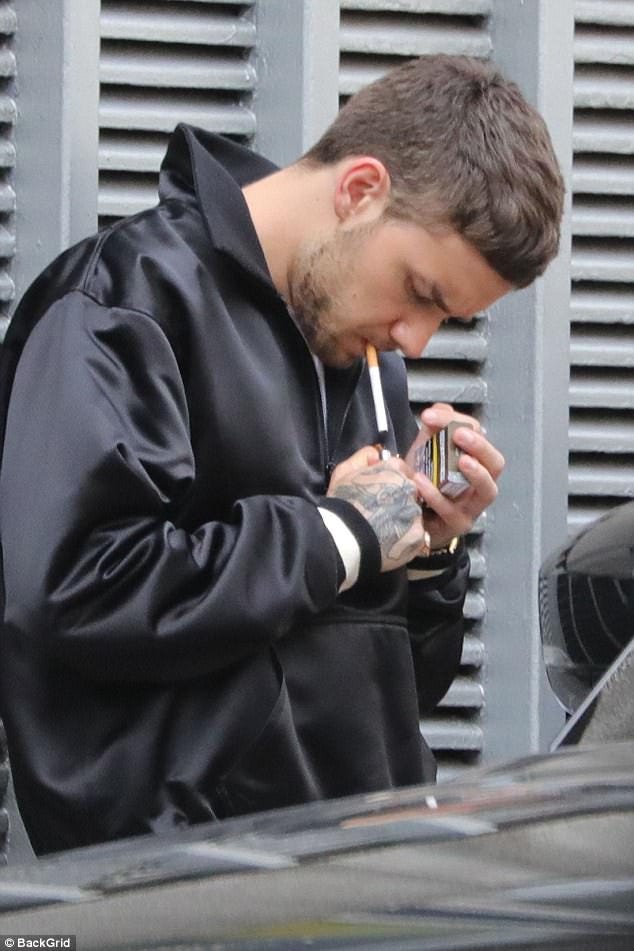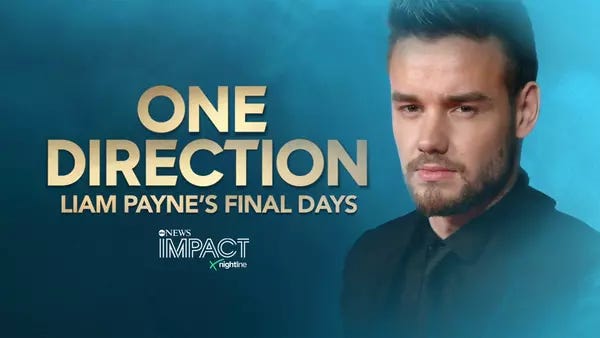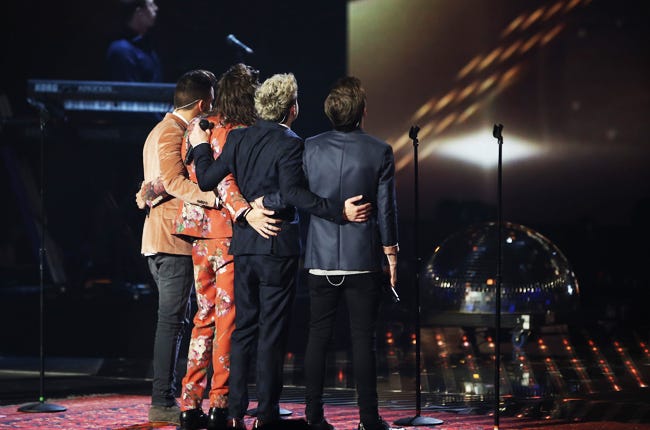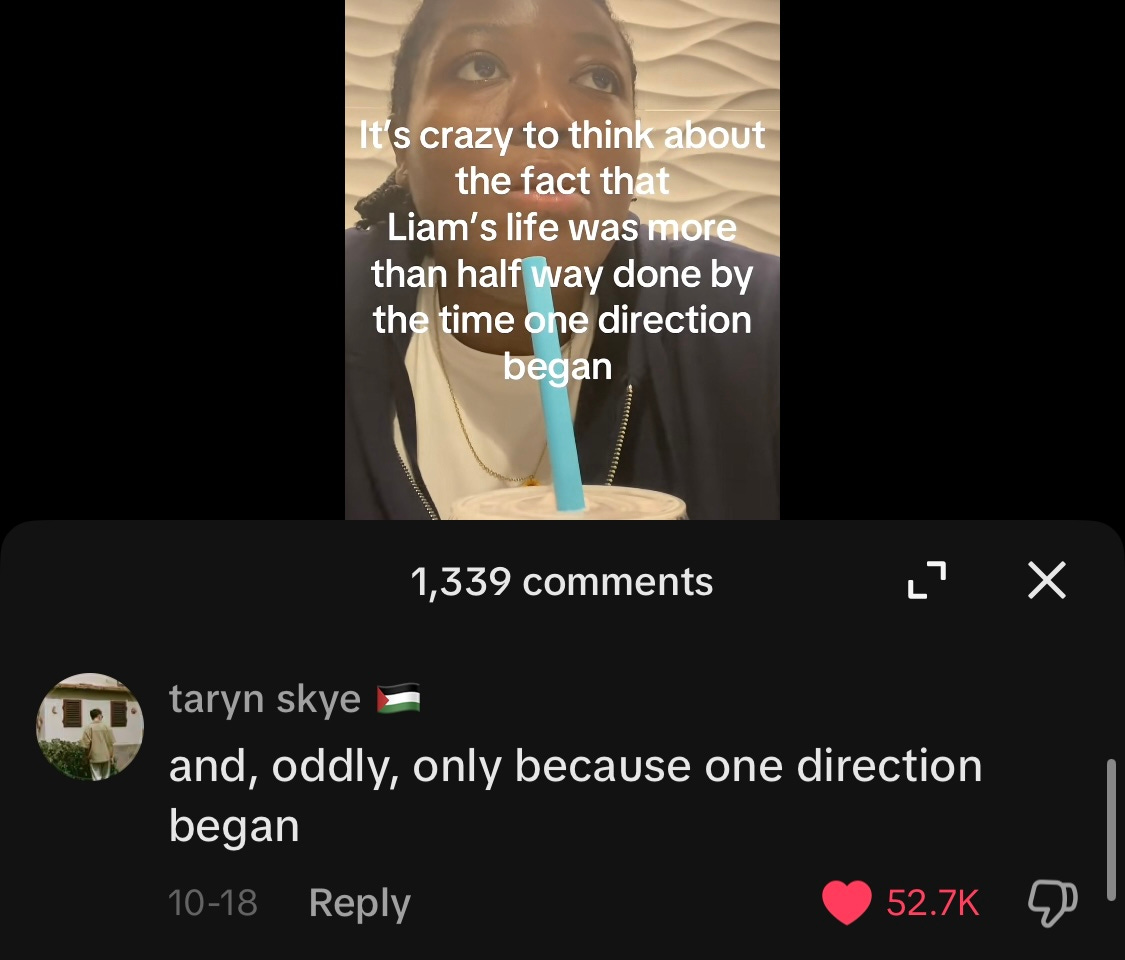Death of Liam Payne: One Direction, The price of fame, and The end of an era
No more 1D reunion, huh?
7:52 am, October 17th, 2024, I woke up to my friend texting me this:
It didn’t feel real. “Liam Payne” and “died” did not belong in one sentence, at least in 2024. Or any time in the next 50 years. But somehow it did. And it did, in one of the most terrible ways.
The emotions did not set in until the band members posted their tributes, one by one: Zayn’s, then Louis, Harry, and Niall. Four nails punctured a coffin. I cried every single time I read the tributes, listened to 1D songs again, and watched their music videos like I did every afternoon after school as a kid. It was almost like the little girl inside me came back to grieve the part of her that is now forever missing.
It's funny that I never even liked Liam—if you don’t want to say he was my least favorite 1D member. Young me would say that he’s “ugly,” and a day before his death, I would say his career is crumbling, and he has the least successful solo career out of the five lads. It took me his departure to realize how vital his existence was, appreciated or not: he was the “leader” of One Direction. He unarguably had the best songwriting and vocal skills in the group. On top of that, he was a star, brought down by fame.
The price of fame
Fame. The little rascal that almost everybody has thought of chasing after, but only a few catch it, and only a few out of those few survive it. It was also what thousands of X-factor contestants in 2010 searched for.
A bit of backstory
By the rarest coincidence, guest judge Nicole Scherzinger and Simon Cowell chose five teenage boys who FAILED the competition (the youngest being only 16) to become a boy band. Boy bands—something that had more of a 90s thing to it—were being attempted to be revived by X factor judges in 2010. Simon Cowell, the man who started this idea, was defeated many times through previous attempts, where the boys did not get along and refused to work together.
This 2010 attempt could be considered the “final straw.” It will be the end if the boys do not get along again.
But luckily for Simon, no one will ever know what that end will be like because he hit the jackpot this time. Niall, Louis, Liam, Harry, and Zayn: five boys who never met before; one isn’t even British like the others, but somehow just hit it off. They had personalities and looks distinctive enough for a typical “boy band,” the charisma, the talent.
And as they say, the rest is history (pun not intended).
The cool thing is that Liam’s case was different from the rest of the boys'. By the time One Direction was formed, he had auditioned for The X Factor TWICE—the first one being two years prior, when he was 14.
To recap: his vocal skills were terrific for a 14-year-old, he…winked at Cheryl, who was 10 YEARS HIS SENIOR (subtle foreshadowing), and Simon said he should come back in 2 years because he was too young—which he did, and then failed again, but managed to un-fail himself.
One Direction released their first album, “Up All Night,” in November 2011 (more than a year after they were formed and performed on various shows together), embarked on a tour one month after, and in a year (yes, 365 DAYS), their names were heard all around the World. They went on to release one album and go on one world tour (which only grew over time) every year after that for 4 years until 2015, when 1D went on a hiatus.

I assume the audience reading this lived through the early 2010s and was aware of who One Direction was but might not know the fame and impact they had at the time. To visualize:
2012: They sold out Madison Square Garden, the legendary New York arena, in under ONE MINUTE. 2 years after forming.
2013: First boyband to gross $1 billion (Business Insider, 2013)
2014: Highest-grossing tour of the year, the highest-grossing tour by a vocal group in history, and the 15th-highest-grossing concert tour of all time, grossing $290.2 million (Forbes, 2015)
Other achievements: Nearly 200 awards in 5 years, including seven Brit Awards, four MTV Video Music Awards, and six Billboard Music Awards, and they also sold more than 70 million albums worldwide (Variety, 2024), making them one of the best-selling boy bands of all time.
Now, let’s stop and think about this for a moment. Five teenage boys, dropped out of high school to record and perform music worldwide, got their lives turned upside down overnight, then worked non-stop for 5 years straight. Does this sound normal to you? Does 5 albums and 5 world tours in 5 years sound normal? Does exposing 17-year-old boys to THAT kind of fame sounds normal? Because it is not. In short, they were seen as money-making machines by their label and were exploited for every last drop of a penny.
Impact of exposure to fame on teenagers, in general
Fame is nothing new in popular culture for children and teenagers. Since the rise of Hollywood, particularly in the first half of the 20th century, we have seen them being in the spotlight: Shirley Temple, Judy Garland, Brenda Lee, Jackie Coogan. The names only increased as time passed, with notable faces we are all familiar with, like Justin Bieber, Lindsay Lohan, Macaulay Culkin, Miley Cyrus, Demi Lovato, Britney Spears, and so on. What all of these stars have in common, though, no matter which decade they rose to fame in, is how they struggled with fame in the aftermath. Addiction, depression, anxiety, and even legal issues are a pervasive theme among these people. Clearly, there is a big difference between letting teenagers make art and turning them into multi-billion dollar, purpose-built corporations.
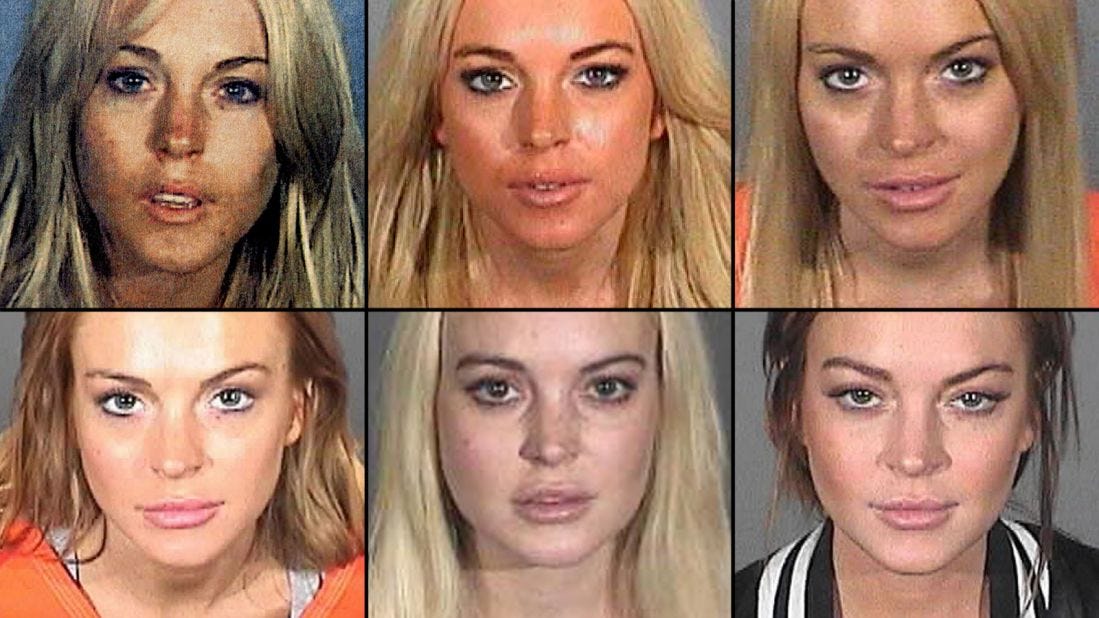
“If a young person is already seen as different in a particular way or misses out on the experiences that others routinely have then this can impact on how they feel in the world, how they view it and therefore their relationship with both themselves and others. Isolation, loneliness, pressure, emptiness, and fear are feelings that can weigh heavily on famous people.”
Psychotherapist Nicholas Rose
“There may be a greater sense of desire in a young person “really wanting to make it work,” which can also lead them to ignore red flags and the voices of those trying to help. Add to that the physiological research which suggests the pre-frontal cortex–where consequences, decisions, reasoning and other higher-order functioning occurs–doesn’t fully develop until the age of 25, and a younger person is likely to be more malleable.”
Dr. Audrey Tang
Shirley Temple never really got out of the shadow of herself as a child star; she smoked for most of her life until she died because of her excessive smoking at the age of 85 (which, to be honest, is a surprisingly old age to die at if she really did smoke that much) (Harmetz, 2014). Judy Garland, subjected to intense studio pressures and hooked on pills since 15, struggled with self-image and substance abuse haunting her throughout her life (Nicolaou, 2020).
Fast forward to the 21st century, the narrative remains concerning. Justin Bieber (someone who had somewhat had a similar story about fame compared to One Direction) and his meteoric rise to fame at 15 exposed him to invasive media scrutiny and a lack of personal boundaries. His 2011 documentary “Never Say Never” revealed an “unfiltered” glimpse into his life as a 16-year-old “normal” teen who was at the peak of his fame after his hit song “Baby” in 2010, selling out Madison Square Garden AND Wembley Stadium in a single year—something they called the “Bieber fever.” Looking back, despite how much they tried to cover his life up as that hardworking, charming, “good boy” star, recent admissions revealed how he has battled with depression, anxiety, and addiction as a result of becoming famous so young. He was even sexually assaulted as a teen by the very, very famous Diddy (Forbes, 2024), and only after this did he gain a more positive view and support from people.
Miley Cyrus, who became a household name through Disney's "Hannah Montana," has been candid about the detrimental effects of her demanding schedule during her teenage years (Nesvig, 2023). She revealed that the relentless pace led to physical and emotional exhaustion, impacting her mental health and personal development. With 13-year-old Miley Cyrus at its core, Hannah Montana made billions of dollars for Disney Channel through licensing deals and merchandise. I still remember one video of her answering fan questions on stage at 14 in such a… professional manner that it just breaks my heart. It’s just not normal for someone fourteen to be able to act and talk that way. And she had to do that EVERY DAY for YEARS.
“Those words should never be put together – teenage role model.”
Demi Lovato in her 2024 documentary “Child Star.”
These narratives highlight a recurring theme: the entertainment industry's failure to safeguard the well-being of its youngest talents. The lack of adequate support systems and the relentless pursuit of profit often leave child stars vulnerable to exploitation and mental health crises. As society continues to consume content featuring young performers, it becomes imperative to advocate for more stringent protections and to foster an environment that prioritizes their holistic development over commercial success.
But is the answer always psychological? If the entertainment industry, team, and management do not intend to stop the exploitation, therapy will not be the answer. It might even go the wrong way (the theme of “I-went-to-therapy-and-it-did-not-work” isn’t new in music). It will take lots and lots of change for the situation to improve, which, in recent years, people have gained more awareness about, but it is not enough.
(Oh, how I will now need to write an entirely new post about Bé Pam and how most people do not give a single shit about this in Vietnam.)
How fame affected One Direction
Small note: This next part will include citations of a lot of quotes from different interviews, documentaries, and podcasts. For better access, I will put the sources in the form of a hyperlink instead of listing them formally in the “Sources” section at the end.
At the height of their fame, the members of 1D were so incredibly young, barely out of their teenage years. Achieving that much at the age of 22-25 is absolutely impressive, but it sure will do something to you—and it shows: they got into drugs, smoking, and everything you can think of when “the dark side of the entertainment industry” is mentioned. The music industry is a dark place, and there, it’s easy, too easy, to get your hands on things that you shouldn’t. These teenage boys were given easy access to hard drugs, alcohol, and women, and in that situation and age, it is what they will reach out to. I still remember this INFAMOUS leaked video of Louis and Zayn smoking weed in a car that caused a stir on the internet.
Disclaimer: I do not mean to “objectify” women as something that can be “given,” but is it wrong to say that these boys could get any girls that they wanted? They didn’t even have to find girls; those fangirls would pay THOUSANDS to touch their hair, let alone spend the night with them.
They faced mental issues. They were sexualized as teens—interviewers and fans were always trying to pry into their private lives, crossing too far into the boundary. On top of that, they were exhausted. Exhausted from working and of stardom, living a life of somebody else’s expectations instead of being their true selves. Shows after show, tour after tour, and album after album. Though they were given more independence in the last few albums (visible through the songwriting credits in “Made in the A.M.” and “Four” or the transformation from “good boys” to “bad boys”), the work schedule and exploitation by their label were far too much to handle. In the last few years, you can see through the interviews that they no longer want to do it. Take this REALLY tense interview as an example (there’s this particular video that I can not currently find, but there, the interviewer asked about their plans and maybe their 8th, their 10th album, and Niall and Harry just had the most disappointing look and did not even try to hide the fake laugh to go through it). People speculated that Zayn’s departure contributed the most to the band’s hiatus, but I believe that whether Zayn left or not, 1D’s end was inevitable. Had they not been exploited to that level, we might still have One Direction singing on stage today.
In a podcast interview in July 2023, 8 years after he departed from the group, Zayn explained in detail why he left One Direction. He cited a lot of reasons, but one of them was “There was obviously underlying issues within our friendships, too. We’d got sick of each other, if I’m being completely honest.” This is entirely understandable, considering they stuck to each other nearly every single day for half a decade. In the same interview, he also mentioned how his anxiety was a big thing back in the day, and that’s partially why he did not enjoy his time in One Direction (paparazzi, not being able to live an everyday life…)
Zayn was not the only person feeling this way about One Direction. Liam Payne once mentioned in a 2017 Telegraph interview:
“It’s great that people can see what we’re really like away from each other. It got to a point where we were just playing characters, and I was tired of my character.”
In his 2023 documentary “All of Those Voices,” Louis Tomlinson also reflected on his time in One Direction and launching his solo career, stating:
“It had always been in my mind that it’d be cool if we weren’t just the standard boyband who just got given songs and sang them (…) I realized that we might be able to make a few of our own decisions and that was the first moment in my One Direction career that I felt ownership of what we were doing. All of a sudden, I felt in control again.”
“The first two and a half years, I just felt like I wasn’t in control of myself and certainly not necessarily had an influence on the band.”
Outside of interviews, the band members’ solo music also reveals somewhat a bit about their struggles with fame:
Liam Payne after One Direction
Solo career
After the group went on a break, Liam released his debut album “LP1” in 2019, including the hit single “Strip That Down.” He also released some pretty popular songs like “For You” with Rita Ora or “Familiar,” but none did as well as Strip That Down.
…and that was precisely the problem. His solo career, in general, did not go well. Harry and Zayn were hitting the charts, and Niall and Louis, though less popular, still managed to navigate their way and find their spot pretty early on, releasing both their debut albums in 2017, and are still looking ready for the long run.

Liam never really found his place. His debut album was not received well, and on top of that, he was struggling with addiction, mental issues, getting dropped by his record label days before his death/in anticipation of his second album, and personal life issues, one of them involving his relationship with Maya Henry (to talk about this would be too much for a Substack post. I will not be stating my opinion about this case right now, but you can read more about the whole thing here)
Addiction, mental issues, and public image downfall
“It’s almost like putting the Disney costume on before you step up on stage, and underneath the Disney costume, I was pissed quite a lot of the time because there was no other way to get your head around what was going on. I mean it was fun. We had an absolute blast, but there were certain parts of it where it just got a little bit toxic”
Liam talking about his time in One Direction in an interview for Men’s Health Australia in 2019
To be really honest, I believe ALL of One Direction had been hanging on to drugs, alcohol, and smoking at some point in their career—and I won’t be surprised if you tell me some of them still do today (Harry said most of Fine Line was recorded while he was on mushroom)—Liam must have gone through the worst of it all. He was pretty vocal about it, too, but while you would expect a RECOVERING person to share about it, he never seemed to be “recovering." Sure, he might have been doing better compared to a few years ago, but the issue was still there.
“When we were in the band, the best way to secure us because of how big it got was just lock us in our rooms. And of course, what’s in the room? Mini bar. So at a certain point, I thought, ‘Well, I’m going to have a party for one and that just seemed to carry on for many years in my life.”
“There is some stuff that I have definitely never, never spoken about. It was really, really, really severe. And it was a problem”
Liam in a 2021 episode of “The Diary of a CEO” podcast
Besides alcohol, Liam struggled with anxiety, as mentioned in an interview back in 2019 with Esquire Middle East. During another interview with Sky News in the same year, Liam revealed that he had experienced suicidal thoughts at times during his career, saying how he’d consider killing himself:
“For some certain circumstances — I’m quite lucky to be here still, which is something I’ve never really shared with anyone. Every so often, you’re like, “When will this end?” That’s almost nearly killed me a couple of times”
See how I listed a lot of interviews? Liam was like that: answering way too many interviews and questions, sometimes to the point that made people wonder why he was even doing it, why he was so open about everything that should be kept personal, and why he was taking interviews from the most…questionable people. Even people who had questions with the intention to hurt him.
He joined one podcast episode of Logan Paul’s “IMPAULSIVE” in 2022, where he was somewhat drunk and made controversial statements about his time in One Direction (claiming 1D was built around him), and criticisms of Zayn Malik, saying, “there's many reasons why I dislike Zayn and there’s many reasons why I’ll always, always be on his side,” which led to a significant backlash, some blaming Logan Paul—but most (even the fans) was disappointed in Liam for oversharing and basically “acting like a dick.” Louis, Liam’s closest friend in the band, later called out Logan Paul on a podcast (skip to 53:05 in the video):
“He knew exactly what he was doing, the buttons he was pressing (…) it just felt disrespectful (…) and they got so much out of it as if you don’t get enough already, I fucking hate them Paul brothers.”
Some speculated that Liam started to seek professional help after this controversy. In July 2023, Liam told fans on YouTube that he spent 100 days in rehab to recover from addiction:
“I just needed to take a little bit of time out for myself actually because I kind of became somebody who I didn’t really recognize anymore. And I’m sure you guys didn’t either. I was in bad shape up until that point, and I was really happy more than anything when I arrived to kind of put a stopper on life and work.”
“It’s good to be in this position. I definitely don’t need those things anymore. The party’s over.”
But the party was, in fact, not over, because a year and a half later, Liam brought that party down to his death.
Death
Liam Payne was found dead at the age of 31 in a hotel in Buenos Aires, Argentina, on a trip to join his old friend Niall’s concert. Traces of drugs were found in his body and in his hotel room, where he fell three floors down from the balcony—unreleased CCTV footage shows that he fainted on that balcony rather than jumped. I won’t be going into much detail, but that summarizes a complicated case.
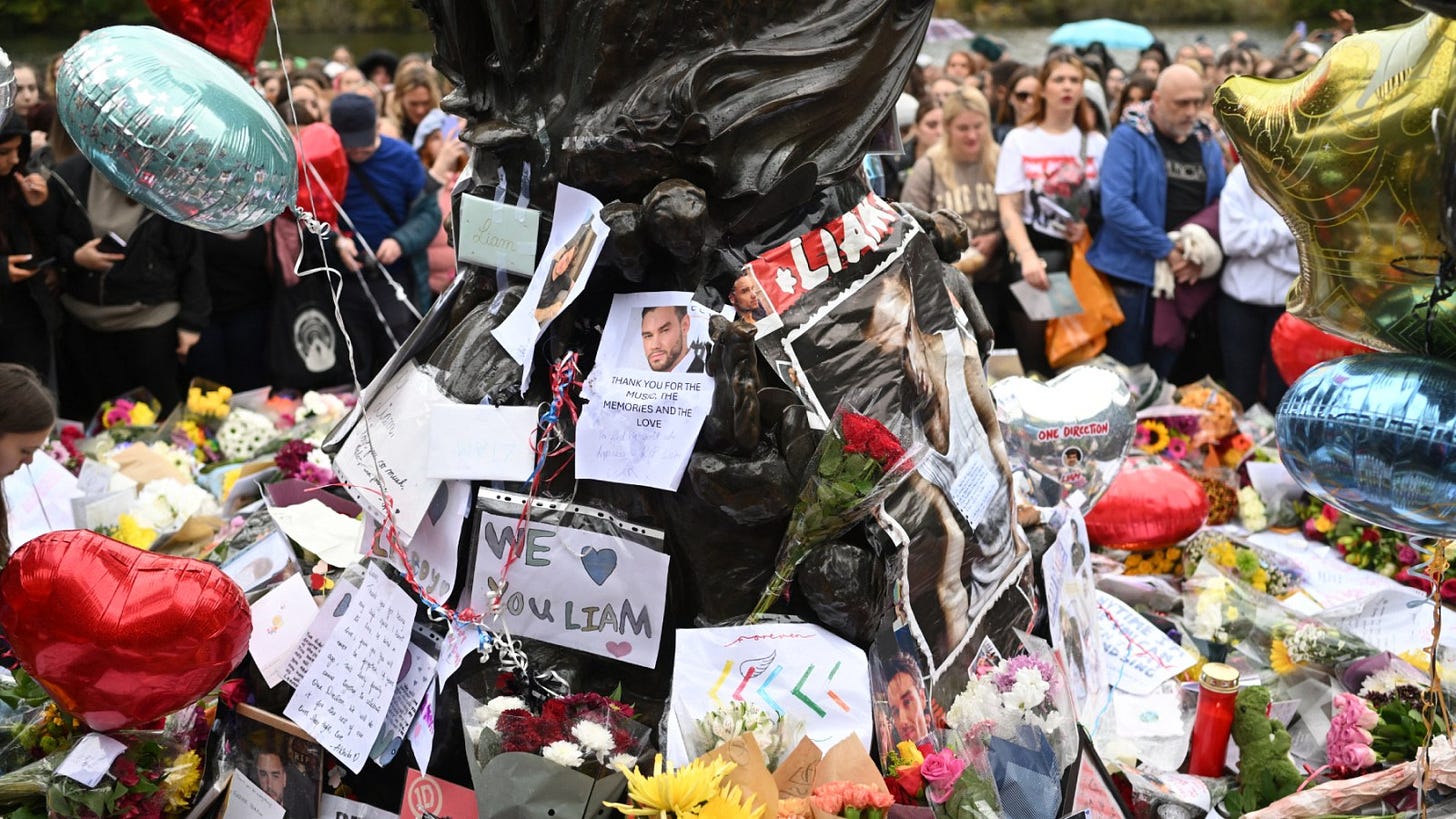
Even after his death, fame didn’t let him rest. Pictures of his COPRSE were released online by TMZ, which only got taken down because they received so much backlash—and unfortunately, things will stay forever on the internet once they get on the internet. A Hulu special dissecting his final hours has been released, announced just days after his death. Singer Sam Pounds announced on social media that he will be releasing a posthumous song featuring Liam called “Do No Wrong” on November 1st, only to receive yet another wave of backlash calling out how he was “using” Liam’s death for money. He later announced the release would be postponed so the family could “morn in peace.” It seems even death doesn’t stop greed, and it breaks my heart to see how people can continue to exploit him and his image for their personal needs with no shame.
Fans have responded by proposing "Liam's Law," a law requiring the industry to safeguard its youthful talent. Music industry leaders, such as songwriter Guy Chambers, have advocated for a complete ban on minors entering pop groups. Despite this, Simon Cowell stated in early 2024 that he would start a new reality program to "find the next One Direction," even though The X Factor concluded in 2018. Boys between the ages of 16 and 18 were asked to try out for the opportunity to become a "global superstar" through an online casting call. This had only resurfaced as a problem after Liam’s death. I also have some questions and opinions against Simon Cowell, and I wish that no other child or teenager would have to go through what One Direction members did.
End of an era
Liam Payne’s death is really the “end of an era.” He was one of the first major celebrities of this generation to pass away, and his death marks the absolute end of One Direction. Though their hiatus, if not obvious enough, can be considered a full-on disbandment, fans still cling to the hope that they will reunite sometime in the future, hoping so much that it became a joke at that point, and interviewers would still sometimes ask the member that same old annoying question: “When is One Direction getting back?”
But it’s all over now. We won’t ever get the “I hope 1D is getting back this year” TikTok videos again. Interviewers won’t ask Harry, Louis, Niall, and Zayn about One Direction for at least a while, and One Direction will be a big “elephant in the room” for them. It’s a big full stop for a lot of things, but the way it happened and how suddenly it was just so painful.
I want to end this with three of my favorites I have seen on social media about Liam since October 16th. Some are sad. Some are sweet. Some are both (I watched the video below a few days after his funeral, and it hit me like a truck—turn on sound):

Sleep well, Payno. In another life.
Stuff you should read/watch:
Some stuff that I read and watch in the progress of writing this post I found extremely helpful/interesting that you should give a go too:)
A full One Direction break up timeline: https://www.reddit.com/r/popculturechat/comments/14xtytd/one_direction_breakup_timeline_deep_dive/
The full, detailed timeline of One Direction:
A commentary and analysis of Liam Payne’s downfall:
A detailed analysis of Larry Stylinson (not related, just found it interesting):
Sources
(1) Bennett, T. (2024). One Direction star Liam Payne’s battles with fame. BBC. [online] 19 Oct. Available at: https://www.bbc.com/news/articles/cqjrn4wv2wxo.
(2) Dazed (2024). What does fame actually do to your brain? [online] Dazed. Available at: https://www.dazeddigital.com/life-culture/article/64935/1/what-does-fame-do-to-your-brain-child-stars-psychology-liam-payne.
(3) Harmetz, A. (2014). Shirley Temple Black, Hollywood’s Biggest Little Star, Dies at 85. The New York Times. [online] 11 Feb. Available at: https://www.nytimes.com/2014/02/12/arts/shirley-temple-black-screen-star-dies-at-85.html.
(4) Harris, R.R. (2024). Liam Payne’s Ex, Cheryl Cole, Calls Out ‘Media Exploitation’ of Singer’s Death: ‘We Have Lost a Human Being’. [online] TheWrap. Available at: https://www.thewrap.com/cheryl-cole-liam-payne-dead-media-exploitation-one-direction/.
(5) Horowitz, S.J. (2024). All One Direction Albums Return to Charts After Liam Payne’s Death. [online] Variety. Available at: https://variety.com/2024/music/news/one-direction-albums-return-to-charts-liam-payne-death-1236192854/.
(6) Hussain, I. (2024). Liam Payne: The Art Of Complex Grief - Iram Hussain - Medium. [online] Medium. Available at: https://medium.com/@iramh18/liam-payne-the-art-of-complex-grief-c7c9b405b040.
(7) Jeetendr Sehdev (2024). Sean ‘Diddy’ Combs, Justin Bieber: The Ripple Effect Of Brand Scandal. Forbes. [online] 9 Oct. Available at: https://www.forbes.com/sites/jeetendrsehdev/2024/10/08/sean-diddy-combs-justin-bieber-the-ripple-effect-of-brand-scandal/.
(8) Latifi, F. (2024). Demi Lovato on Her ‘Child Star’ Documentary, the Price of Early Fame, and Moving Forward. [online] Teen Vogue. Available at: https://www.teenvogue.com/story/demi-lovato-cover-september-2024.
(9) McIntyre, H. (2015). These Were The 10 Highest-Grossing Tours Of 2014. [online] Forbes. Available at: https://www.forbes.com/sites/hughmcintyre/2015/03/24/these-were-the-10-highest-grossing-tours-of-2014/.
(10) Nesvig, K. (2023). Everything Miley Cyrus Has Said About Being a Former Child Star. [online] Teen Vogue. Available at: https://www.teenvogue.com/story/everything-miley-cyrus-has-said-about-being-a-child-star.
(11) Nicolaou, E. (2019). What Made Judy Garland’s Life So Tragic. [online] Refinery29.com. Available at: https://www.refinery29.com/en-us/2019/09/8455229/judy-garland-actress-true-story-life-death.
(12) Ramo, E. (2023). Britney Spears’ Memoir Holds One Truth: The Shame In Fame For Women. Forbes. [online] 1 Nov. Available at: https://www.forbes.com/sites/elsaramo/2023/11/01/britney-spears-memoir-holds-one-truth-the-shame-in-fame-for-women/.
(13) Sherman, M. (2023). ‘One Direction: This Is Us’: 10 year anniversary revisit. [online] Business Insider. Available at: https://www.businessinsider.com/one-direction-this-is-us-look-back-nostalgia-director-2023-9.
(14) Sowerby, P. (2024). The tortured fame of Liam Payne. [online] UnHerd. Available at: https://unherd.com/2024/10/the-tortured-fame-of-liam-payne/.




